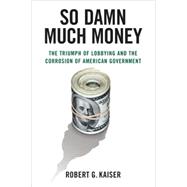
Robert G. Kaiser has been with The Washington Post since 1963 and is now associate editor and senior correspondent. His books include Russia: The People and the Power and, with Leonard Downie Jr., The News About the News. He has received awards from both the Overseas Press Club and the National Press Club. He lives in Washington, D.C.
The New copy of this book will include any supplemental materials advertised. Please check the title of the book to determine if it should include any access cards, study guides, lab manuals, CDs, etc.
The Used, Rental and eBook copies of this book are not guaranteed to include any supplemental materials. Typically, only the book itself is included. This is true even if the title states it includes any access cards, study guides, lab manuals, CDs, etc.
Excerpted from So Damn Much Money: The Triumph of Lobbying and the Corrosion of American Government by Robert G. Kaiser
All rights reserved by the original copyright owners. Excerpts are provided for display purposes only and may not be reproduced, reprinted or distributed without the written permission of the publisher.